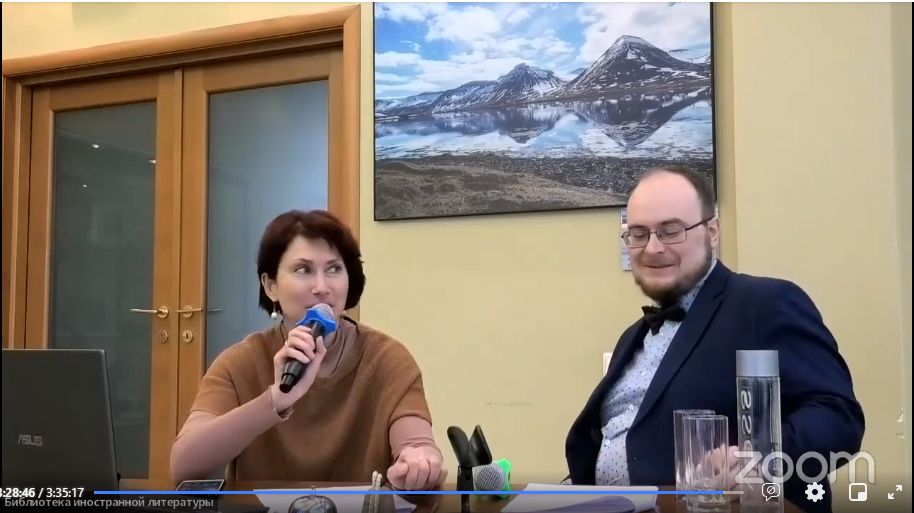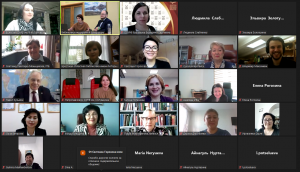Today’s national borders, certainly, pose no obstacle to the development of a single cultural and information space where universal human values are preserved and passed on from generation to generation.
Libraries in border territories have been known for their great contribution to strengthening inter-State socio-cultural ties, preserving the local cultural heritage and fostering the exchange of contemporary cultural achievements. These libraries instill greater respect for the national history in the younger generation. They encourage local people to take part in international cultural projects, which promote tolerance towards other cultures and ways of life and prevent conflict.
Library for Foreign Literature (LFL) in Moscow has been acting as an international activities methodology centre for the libraries in Russia’s regions. LFL has paid great attention to cultural projects involving the CIS countries.
On 18 February, 2022, LFL hosted a meeting entitled “Library Dialogue of the CIS Countries and Border Territories” to exchange professional experience, discuss best practices and work out methods to bolster cooperation between libraries in the border territories.
Over 70 managers and experts from federal and regional libraries in Russia, Belarus, Kazakhstan, Kyrgyzstan and Uzbekistan participated in the meeting remotely. By inviting Russian libraries which have counterparts in the Nordic and Baltic countries, East Europe and Asia, the hosts have deliberately gone beyond the geographical scope of the Commonwealth of Independent States so that the cross-border cooperation, its practices and opportunities, could be viewed in a broader light.
The main purpose of the meeting was to create a methodology for the development of the international cross-border cooperation for different libraries – from municipal to national ones. That’s why the meeting’s programme was split into two blocks – theoretical and practical. The first block discussed trends in the cross-border cooperation over the past 20 years. The participants listened to presentations by experts from Russia’s leading methodology centres: LFL, Russian State Library, Library Assembly of Eurasia and Intergovernmental Foundation for Educational, Scientific and Cultural Cooperation. The second block highlighted best practices of the cross-border cooperation in Russia, Belarus, Kazakhstan, Kyrgyzstan and Uzbekistan.
The programme was structured as a dialogue between librarians from the CIS countries: they discussed joint projects and analysed their impact on various aspects of the social life in the cross-border communities.
Prior to the meeting, LFL prepared and sent out to the participants a special presentation template to structure the presented factual information:
- The title of the project realized by the library in the framework of the cross-border cooperation.
- The project’s goals.
- The project’s description.
- Partners
- The results reached in 2020 – 2021.
The presentation’s time limit was 5 min.
This timing mode helped to build a dynamic and well-structured pattern to summarize the practices and identify trends in the cross-border cooperation, taking into account:
- the region’s history and geography;
- the project’s political, economic and social background;
- social and ethnic compositions of the local population, their cultural and educational needs that can be met by the project.
The Library Dialogue meeting allowed its participants to see how the cross-border and, in a broader sense, international cooperation can help strengthen socio-cultural ties. It showed how libraries in the border territories could share their information potential and achieve significant progress in providing library and information services to their ethnic minorities. It also demonstrated opportunities for revitalizing international professional exchange and introducing innovations in the library field.
To summarize the results of the Library Dialogue meeting a methodology document is being prepared to be used as guidelines for developing and implementing international library projects in the cross-border territories.
Daria Beliakova,
Head, Center for Library Science and Professional Interaction, M. I. Rudomino All-Russia State Library for Foreign Literature, Moscow, Russia,
SC Member of the CPDWL IFLA
Maria Bereslavskaya, Leading Specialist,
Center for Library Science and Professional Interaction, M. I. Rudomino All-Russia State Library for Foreign Literature, Moscow, Russia

